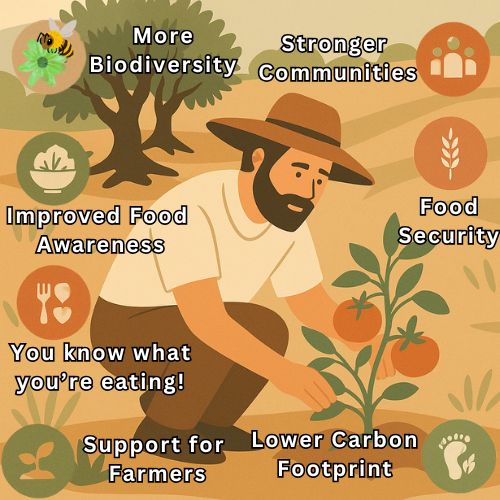🌍 Why Growing Your Own Food Helps Fight Climate Change
Share

By Food-Landscaping
Gardening isn’t just about tasty tomatoes or saving money on herbs. It’s also a surprisingly powerful way to take real, hands-on action against climate change.
Even a small patch, a container garden, or a few pots on your windowsill can have ripple effects far beyond your plate. From reducing emissions to restoring soil, here’s how growing your own food actually makes a difference—and why your garden matters more than you think.
🚛 1. Reduces Food Miles and Emissions
Most food in shops travels hundreds—sometimes thousands—of miles before it hits your fridge. That journey includes trucks, planes, refrigeration units, and plastic packaging. All of it adds up to a huge carbon footprint.
By growing food at home, even just a few crops:
-
You eliminate transport emissions and cold storage
-
You reduce reliance on global supply chains
-
You cut down on plastic packaging
🌱 Example: A single head of lettuce can travel over 800 miles. Yours can travel 3 feet from the garden to your plate.
🌱 2. Builds Healthy Soil (Which Stores Carbon)
Soil is one of nature’s best carbon sinks—but only if it’s alive and healthy. Unfortunately, industrial farming often depletes soil with tilling, chemicals, and monoculture practices.
When you:
-
Use no-dig gardening techniques
-
Compost your own kitchen and garden waste
-
Mulch and cover your soil naturally
You’re helping trap carbon in the ground, just by keeping the soil undisturbed and fed.
🪱 Tip: Composting and worm castings aren’t just waste reducers—they’re carbon builders too.
🗑️ 3. Cuts Food Waste (and Methane Emissions)
Globally, around one-third of all food is wasted—and when food breaks down in landfills, it releases methane, a greenhouse gas far worse than carbon dioxide.
Home gardening flips the script:
-
You pick only what you need, when you need it
-
You value your harvest more, because you grew it
-
Scraps and peels go straight back into your compost or worm bin
That means less waste, less methane, and more closed-loop cycles right in your garden.
🐝 4. Supports Biodiversity (Without Pesticides)
Even small food gardens can double as mini nature reserves. When you grow without synthetic chemicals and mix your crops with flowers, herbs, and native plants, you invite life back into the landscape.
-
Pollinators like bees and butterflies thrive in gardens with diverse plants
-
Beneficial insects like ladybugs, lacewings, and hoverflies come in naturally
-
Birds, frogs, and even hedgehogs can return when the food web rebuilds
🌼 Just one pot of mint or a flowering herb can feed pollinators all season.
🚜 5. Takes Pressure Off Industrial Farming
The goal of home-growing isn't to replace farmers—it’s to support them.
When more people grow even part of their food, it helps:
-
Reduce demand on mass-distribution systems
-
Give large-scale farmers more space to diversify
-
Encourage better practices through grassroots change
-
Support smaller, local farms, nurseries, and seed-saving networks
By growing food yourself, you’re not opting out—you’re opting into a healthier, more resilient food system.
🥗 6. You Know Exactly What You’re Eating
Let’s be real—a big part of growing your own food is about trust.
In a world of chemical treatments, unclear supply chains, and produce that looks good but tastes of nothing, being able to say “I grew this” is powerful.
When you grow it:
-
You know what’s in the soil
-
You choose whether or not to use sprays
-
You harvest when it’s actually ripe
-
You skip preservatives, coatings, and mystery miles
That’s peace of mind money can’t buy.
🌿 Bonus: Homegrown food just tastes better. You’ll never look at shop tomatoes the same way again.
🤝 7. Builds Resilience and Community
Home-growing isn’t just about what happens in your garden—it’s about what it sparks.
When more people grow food, even on a small scale:
-
Communities become more self-sufficient
-
People reconnect through swaps, seed sharing, and knowledge
-
You become less dependent on fragile global systems
In times of crisis—economic, climate, or supply—a few containers of herbs and greens could make all the difference.
🌿 Final Thoughts: Small Garden, Big Impact
Climate change can feel overwhelming. But growing your own food turns that anxiety into action.
It’s not about growing everything. It’s about growing something.
Something that supports soil. Reduces waste. Nourishes you. And speaks back to the system saying: we can do better.
So start where you are. Plant one thing.
Because your garden isn’t just about you—it’s part of the solution.
